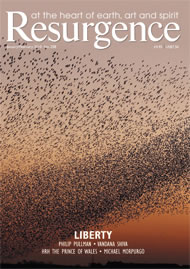Trees are at liberty to grow the way they like. Rivers are at liberty to flow, twist and turn, wander and meander at will. Birds are at liberty to fly and glide, hover and swoop, up and down, as they desire. Forests have no government, no president, no prime minister and no parliament. They are self-organised and self-governing. Mountains and oceans adhere to the implicit and unwritten laws of the universe enshrined in the principles of harmony, rhythm, balance, mutuality, reciprocity and connectivity. The law of the universe is simple and clear: all are related, everything depends on everything else.
In the Vedas of India this law is called rta, a word linked to ‘rhythm’, ‘rites’ and ‘rituals’. The Sanskrit words ritu, meaning ‘season’, and riti, meaning ‘tradition and lineage’, are also related to rta, which can be translated as ‘patterns of life’.
These patterns include co-operation and competition in right proportion: above and below are in balance; male and female complement; light and dark connect. There is a dialogue between and among similars and opposites. The universe is a dance. Within Nature there is no control: there is no need for it. Everything works on the promise of trust and follows the patterns, creatively, intelligently and spontaneously.
In natural systems there is no MI5, no CIA, no courts, no prison, no military, no weapons and no bombs to dominate or rule over others excessively. If there is violence then it is only for food and procreation; if there is a territorial instinct then that is also for food and for procreation. “Nature red in tooth and claw” and “survival of the fittest” are human constructs and human interpretation of natural systems. In reality Nature is neither this nor that. Nature is a great field of diversity, dancing within the space of the universe and within cosmic time.
Humans have, for one reason or another, cultivated a desire to control: first of all to control natural systems and then to control others. It is clear that we cannot control Nature. We cannot control floods or rain, or climate. As far as people are concerned, in spite of our institutions of spying and surveillance, torture and enslavement, permanent organisations of war and structures of conquest, we are failing miserably to win human hearts and minds and to eliminate opposition. In essence we are failing to establish law and order. We are failing to eliminate crime and we are failing to be at ease with ourselves.
Now is the time to stop and observe dispassionately the human predicament. Why are we keeping hundreds of millions of people in jail around the world? Why are we wasting a huge amount of talent, technology and wealth spying on each other, controlling others, fighting wars and murdering innocents? Surely we can do better? Surely we could trust the self-correcting nature of humanity and spend our time, talent and technology as well as creativity and ingenuity to care, to nurture and to replenish as the natural world does?
In order to shift from systems of surveillance, spying, imprisoning, torturing and murdering to a paradigm of protection, peace and empowerment, we need a huge amount of courage, trust and hope. I know governments don’t consider themselves to be in the business of idealism, and what I am proposing may be dismissed as idealism, but where has their realism taken us so far? If the consequence of realism is to spend enormous amounts of resources on controlling, imprisoning, torturing and killing, and producing nuclear weapons, then such realism is of benefit to no-one. Now is the time to give idealism a chance. Now is the time to embrace liberty together with equality and fraternity. That is why in this issue of Resurgence we present a special feature on liberty.
SATISH KUMAR








